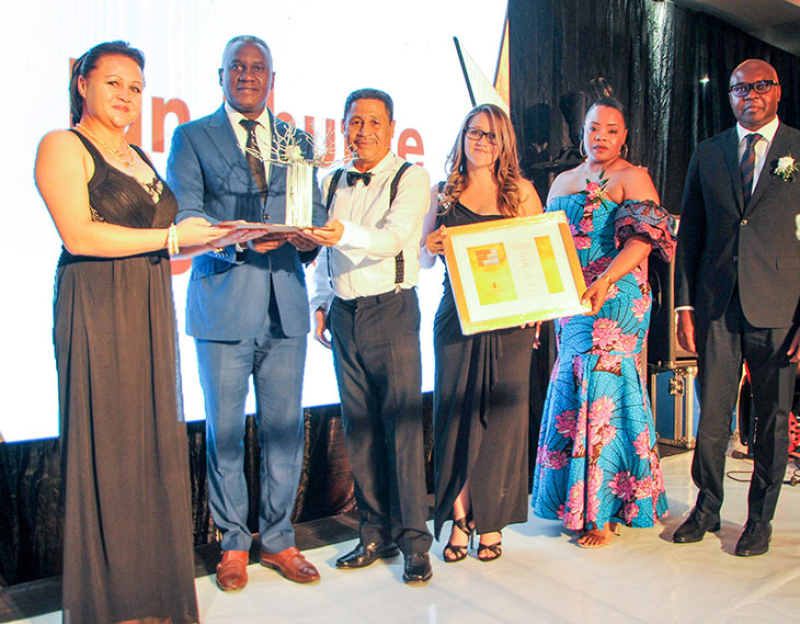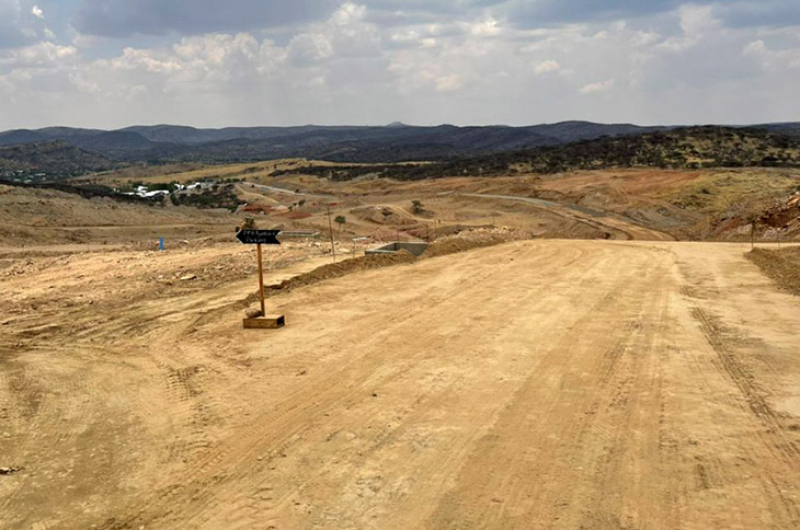 Call 061 290 8000
Call 061 290 8000 Click to mail us
Click to mail us FAQs
FAQs

DBN
Development Bank of Namibia (DBN) Executive of Marketing and Corporate Communication, Jerome Mutumba, has announced the resumption of the Good Business Awards on 3 November 2022, with finalists and winners to be announced at the gala dinner on the same night at Safari Hotel.
The high profile Awards were last held in 2019, were suspended for two years due to Covid-19.
Mutumba said this year’s winners will come from the tourism and hospitality sector, private education, land servicing, manufacturing and the transport and logistics sector.
Talking about the Awards, Mutumba said that they have a twofold purpose. Firstly, they highlight enterprises that have an exemplary development impact combined with excellent administrative practices that contribute to viability and longevity of the enterprise. Secondly, they showcase the contribution that the Bank, through its finance, makes towards development and economic activity in Namibia.
As befits an event of this magnitude, he said, the keynote speaker at this years’ event will be Dr. Nangolo Mbumba, Vice President of the Republic of Namibia, who will confer the awards.
The finalists and winners were determined by a panel consisting of independent judges and experts in their fields from among Development Bank employees.
In previous years, the Bank also conferred an annual Innovation Award. Although the Award will not be conferred in 2022, Mutumba said he was confident that the Innovation Award would resume in 2023.
Talking about the quality of finalists and winners, Mutumba said that the standard is very high. Although there can only be one winner in each if the categories, all of the finalists are exceptional, and represent a win for the Namibian economy and the Bank, he concluded.
Speaking at the launch of Auasblick Extension 1, a public private partnership (PPP) between Sinco Investments and the City of Windhoek, Development Bank of Namibia CEO Martin Inkumbi emphasized the importance of serviced land as a vital pillar for economic growth and activity.
Inkumbi said commercial lenders mainly focus on financing top structures, which consists of housing units which fall either in the of affordable or higher-end segments of the market. There is often a shortage of lenders willing to finance the development of bulk land infrastructure, and this is the gap DBN aims to fill.
Lack of serviced land, he said, hampers progression of home ownership and socio-economic wellbeing, as well as capital formation in families. The presence of serviced land is not just an asset accounted for in the present. It represents the promise of prosperity and economic activity for the future.
Firstly, Inkumbi explained, serviced land and houses can be used as collateral for businesses that are financed. Lack of sufficient collateral is an ongoing challenge in development of the Namibian enterprise ecosystem. By making serviced land available, the entire private sector economy is enhanced.
Secondly, land and houses have value that can be transferred between generations, as intra-generational transfer of wealth between living parents and children, or through inheritances as inter-generational transfer of wealth.
Thirdly, Inkumbi said, serviced land appreciates in value. This appreciation of value can be redeemed through resale.
Talking about the importance of serviced land for the capital, he said Windhoek, which is experiencing a shortage of serviced land and land expected to become part of the wealth of families in all income brackets. This shortage impacts the potential ability of the City to become a driver of economic activity.
Inkumbi went on to explain that all income brackets benefit from land ownership, proportionately to the value of the land. Thus, he explained, smaller parcels of land with a lower municipal value can be used as collateral in financing arrangements for smaller enterprises, while land with a higher value can be used as collateral for larger enterprises. The need for serviced land in higher income brackets is an often overlooked facet of enterprise financing.
A healthy economic ecosystem, he said, consists of an optimal number of small, medium and large businesses with linkages. In this way small enterprises become off-takers of large enterprise goods and services, and vice versa.
He pointed out that Development Bank plays an active role in finance and stimulus for land servicing. In this case, the Bank has approved finance of N$76,855 million for bulk infrastructure for phase one of the Auasblick extension, consisting of 281 erven.
In addition to delivering serviced land on which residential properties will be erected, there is a definite, immediate development impact. During the construction phase employment is created, construction enterprises have the opportunity to earn income and the building supply and manufacturing sectors have opportunities to benefit.
Inkumbi concluded by saying that the Bank is ready and willing to finance land development projects across Namibia, either by financing private developers, local authorities and or through the Bank’s PPP model and its win-win proposition and invited initiators of land development projects to make contact with the Bank.
The Development Bank of Namibia has responded to a query on the auction of erven in Rundu by a court-appointed liquidator. The auction takes place on 13 October 2022 under a liquidation order issued by the High Court against Plato Investments and North Eastern Construction Association (NECA) (the developer).
Jerome Mutumba, DBN Head of Marketing and Corporate Communication, indicated that the matter is no longer under the control of the Bank, and that it has no ability to influence the process as the matter is under the purview of the High Court and its duly appointed liquidator.
In terms of the order, the High Court-appointed liquidator is auctioning 42 serviced erven in Rundu with a reserve price of N$150,000 each. Forty erven have partially completed structures. Some community members have queried the reserve price, stating that it places the erven out of reach of Namibians and favours foreign nationals.
On investigation by the Bank, the liquidator has stated that there are 61 registered buyers for the auction, of whom only four are foreign nationals.
This indicates that there is significant demand and financial capacity of local bidders at the reserve price of N$150,000.
Further clarifying the issue, the Bank stated that the matter of the defaulting developers was initiated in the High Court in September 2019. This followed a lengthy period of engagement with the developer to remedy the situation, restructure the debt and enable the debtor to resume payments.
Despite the Bank’s engagement the debtors did not honour the settlement agreement, resulting in a court-ordered liquidation.





